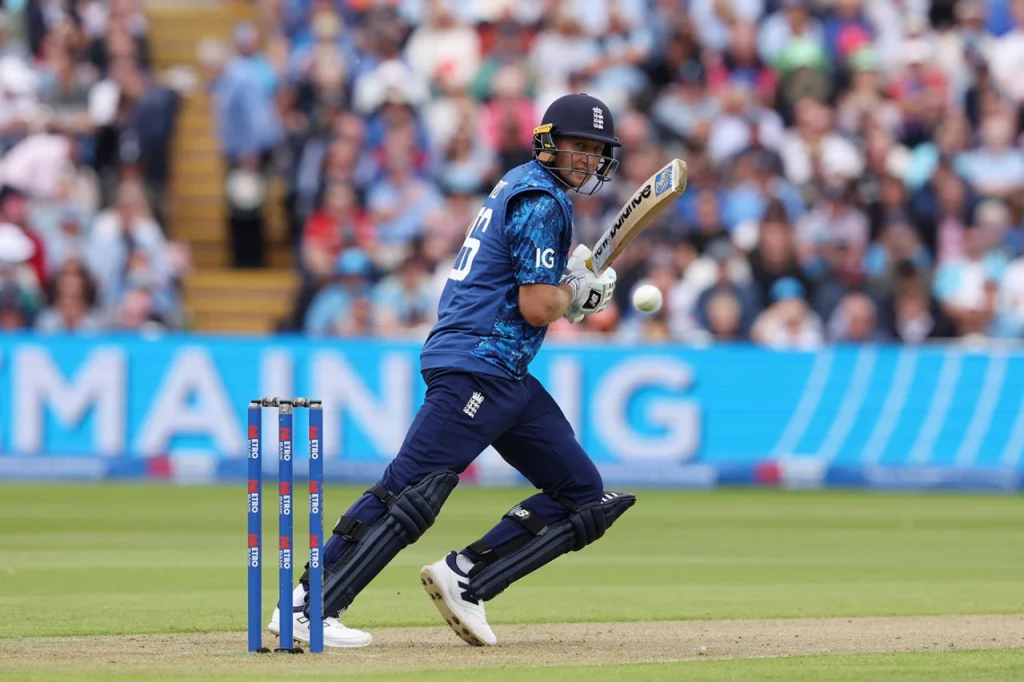On a rainy, blustery Tuesday that began with England crossing the Thames on Lime bikes and the West Indies stuck in traffic, Harry Brook’s one-day side wrapped up a 3–0 series sweep in style, cruising to a dominant seven-wicket win at The Oval.
The Brook era had begun emphatically at Edgbaston, where England racked up 400-8 — their highest ODI total since 2020 — before skittling the West Indies for just 162 in a 238-run thrashing. Jacob Bethell’s explosive 82 and Saqib Mahmood’s incisive 3-32 set the tone for the series.
In Cardiff, Joe Root became England’s all-time leading ODI run-scorer with a masterful unbeaten 166, rescuing his side from 133-5 to secure a thrilling three-wicket win and seal the series.
Then, back in London, England capped off the whitewash in under 30 overs. Jamie Smith launched the chase with a blistering 64 off 28 balls, followed by contributions from Ben Duckett (58), Brook, Root, and Jos Buttler, securing England’s first ODI clean sweep since 2022.
Now, review the series with the Barmy Army…
Standout Moment of the Series – Joe Root Becomes England’s Leading ODI Run-Scorer
Unlike series gone by—where the standout moment might have been a flying one-handed grab at second slip or an edge-of-your-seat hat-trick ball—this one belonged to an unassuming prod down to third man. A 79mph inswinger from Justin Greaves, met with the softest of nudges. No fuss, no flash—just Joe Root doing Joe Root things. Quiet genius. Absolute poetry in motion.
After 15 months away from the format, Root strolled back in like he had never left, serving a timely reminder (as if we had forgotten) that he is still England’s crown jewel across all three formats.
He began at Edgbaston with a fluent 57 off 65 balls, sliding seamlessly into gear after a blistering start from openers Duckett and Smith. But it was in Cardiff, during the second ODI, where he truly claimed this series for his own.
England were on the ropes at 2-2, then 133-5 chasing 309. Enter Root: unflustered, unshakeable, and utterly in control. What followed? Just one of the all-time great ODI knocks by an Englishman. An unbeaten 166 off 139*, finishing the job with the winning runs off Jayden Seales.
Clutch, classy, clinical. It was Root in his purest form—slipping gears like a Rolls-Royce and turning chaos into calm.
In that innings, he not only steered England to an unassailable 2–0 series lead—he also overtook World Cup-winning captain Eoin Morgan’s 6,957 runs to become England’s all-time leading ODI run-scorer, doing so in 46 fewer matches. That quiet nudge down to third? That was the moment the record fell. It is yet another milestone for a man who already tops England’s Test charts and sits proudly as the No. 1 ranked Test batter in the world.
At 34 years old, Root is ageing like the finest of wines. The elegance of his cover drives, the composure under pressure, the way he constructs partnerships from wreckage and calmly rotates the strike, even shepherding the likes of Jacks in new roles and marshalling the tail—is a masterclass in controlled brilliance.
That ODI average of 49 also says plenty. Among England’s top 10 ODI run-scorers, only Kevin Pietersen joins him in averaging over 40.
Root does not just score runs. He defines innings. He wins matches. He sets standards.
And this series? It was Root at his absolute best. So yes, the standout moment was overtaking Morgan; however, it capped off a tremendous innings that could not be ignored.
Sir Joseph Edward Root, at some point, surely?

Special Mention – Will Jacks
When England unveiled their XI for the first ODI against the West Indies at Edgbaston, a few eyebrows were raised — particularly at Smith opening and Jacks slotted in at No. 7. But by now, fans have learnt to expect — and often enjoy — the unconventional choices of Baz and Co., whose bold experiments tend to pay off more often than not. Jacks, long known as a top-order powerhouse, has been reimagined as a finisher under Brook’s captaincy — a role he had never played in List A cricket until now.
“Imagine getting us five down and Will Jacks walks out to bat?” Brook mused last Thursday evening in Birmingham. Well, Harry — in his first ODI innings at No. 7, Jacks responded with a boundary-laced, pedal-to-the-floor 39 off just 24 balls. His explosive cameo, part of a crucial 98-run partnership with Bethell, propelled England to an imposing total of 400 — a bold and emphatic debut in his new role.
But it was Sunday’s innings in Cardiff that truly underscored the value of having, as Brook aptly put it, a “proper batter” in the finisher’s role. With England teetering at 133-5 midway through in pursuit of 309, Jacks played a vital anchoring role in a match-defining 143-run stand with Root. Jacks struck only two boundaries and absorbed 20 dot balls, selflessly playing second fiddle to a masterful Root, whose unbeaten 166 steered England to victory — and sealed the series.
The Captain – Harry Brook
The 2025 ODI series between England and the West Indies marked the beginning of a new era under Brook. Taking over the white ball captaincy from T20 World Cup-winning captain Jos Buttler at the tender age of 25 is no mean feat — especially following a difficult 2023 World Cup and Champions Trophy campaign. Yet, Brook’s cricketing intelligence and boundless talent made him the natural successor. He had already offered glimpses of his leadership potential with the Northern Superchargers and in leading England against Australia last year. But stepping out as captain in front of full home crowds, Brook would have been eager to hit the ground running, and he did exactly that!
Brook’s reign as England’s white-ball captain did not begin in ideal fashion when the Windies won the toss and elected to bowl. But before a ball had been bowled, Brook had laid down clear demands: more runs and more dominance from his batters. He got exactly that, as England piled on 400 in the series opener. His bowlers responded in kind, rolling the visitors for just 162. That commanding lead gave Brook the freedom to showcase the expressive, unconventional side of his captaincy, with bold, aggressive, and at times eccentric field placements that proved highly effective. It was a near-perfect start to a new era.
The second ODI in Cardiff offered a more searching examination. England’s three-wicket win at Sophia Gardens was Brook’s first real test as captain, and he passed it with flying colours. Despite four dropped catches that allowed the Windies to post 308 in 47.4 overs, Brook’s sharp tactical instincts came to the fore. His proactive field settings and calm game management, in tricky conditions, prevented the visitors from pushing their total even further by 30-40 runs and kept the chase within reach. It was another sign that this young captain is quickly finding his feet.
England’s first home ODI clean sweep in four years was fittingly secured with current captain Brook and former captain Buttler at the crease under the cold, blustery, and rainy conditions at The Oval. Brook’s proactive field placements that kept the batters guessing, calm presence at mid-off, and astute handling of the bowlers contributed to two convincing victories. His captaincy unsurprisingly has shades of Stokes and Baz—Stokesy’s gut-feel swagger in the field, mixed with Baz’s “why wait?” mindset of unleashing the big guns straight out the gate. The real tests are still to come, but one thing’s clear: Brook’s slide into the captain’s chair looks less like a learning curve and more like a natural fit.

The Opposition – The West Indies
It was a tough-luck tour for the West Indies, who came into the series with momentum from a commanding 197-run win over Ireland, only to be whitewashed by a sharp, newly inspired England side. There were glimpses of promise throughout, but inconsistency and missed opportunities ultimately cost them.
In the first ODI, the Windies impressed during the middle overs with a tight spell that saw England manage just one boundary in eight overs. But the inability to break the Bethell-Jacks partnership — combined with a faltering chase in which their No. 11 top-scored — left them well short.
The second ODI in Cardiff was the one that got away. Keacy Carty’s superb 103 anchored a strong total of 308, with captain Shai Hope (78) and Brandon King (59) offering crucial support. The West Indies then tore through England’s top order, reducing them to 2-2 within nine balls and later 133-5. At that point, the win predictor gave them a 90% chance of victory. But Root had other ideas. His masterful, unbeaten 166 turned the game on its head and denied the visitors a deserved result. Realistically, smarter choices with the bat could have added another 30–50 runs, and potentially sealed the match.
In the final ODI, the Windies were undone by a string of soft dismissals but also suffered from a touch of misfortune — too often, their well-struck shots found fielders. A late 90-run blitz from Gudakesh Motie and Alzarri Joseph in just 11.2 overs gave England a brief scare, and Sherfane Rutherford continued his impressive form with a fluent run-a-ball 70 — his seventh 50+ score in just 11 ODI innings. Yet their total of 246 was never likely to be enough, and England chased it down with ruthless efficiency inside 30 overs.
Ultimately, the West Indies showed flashes of quality but lacked the consistency and execution to turn performances into results. Their attention now turns to ensuring a top-eight finish to qualify for the 2027 World Cup.
Was the result a fair reflection?
England’s emphatic victories in the first and third ODIs were thoroughly deserved, with Brook’s side outclassing the West Indies in all departments. However, the visitors were arguably denied a shot at a series decider at The Oval — largely due to the brilliance of Root in Cardiff. In that sense, a 2–1 scoreline as opposed to a clean sweep might have been a fairer reflection of the series.
ARTICLE WRITTEN BY JOE TURNER.




